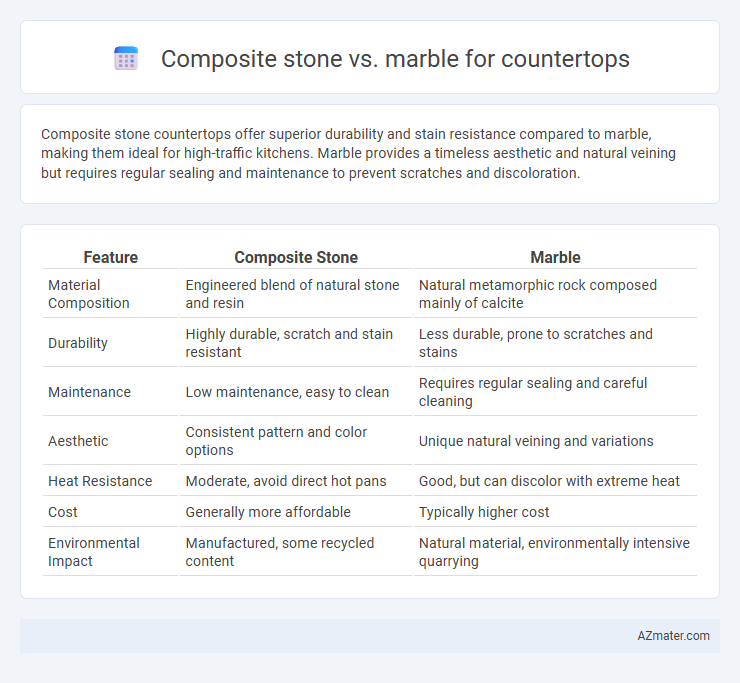Composite stone countertops offer superior durability and stain resistance compared to marble, making them ideal for high-traffic kitchens. Marble provides a timeless aesthetic and natural veining but requires regular sealing and maintenance to prevent scratches and discoloration.
Table of Comparison
| Feature | Composite Stone | Marble |
|---|---|---|
| Material Composition | Engineered blend of natural stone and resin | Natural metamorphic rock composed mainly of calcite |
| Durability | Highly durable, scratch and stain resistant | Less durable, prone to scratches and stains |
| Maintenance | Low maintenance, easy to clean | Requires regular sealing and careful cleaning |
| Aesthetic | Consistent pattern and color options | Unique natural veining and variations |
| Heat Resistance | Moderate, avoid direct hot pans | Good, but can discolor with extreme heat |
| Cost | Generally more affordable | Typically higher cost |
| Environmental Impact | Manufactured, some recycled content | Natural material, environmentally intensive quarrying |
Introduction to Countertop Materials
Composite stone countertops offer superior durability and resistance to stains and scratches compared to natural marble, making them ideal for high-traffic kitchens. Marble countertops provide unique, elegant veining and a timeless aesthetic but require regular sealing and maintenance to prevent etching and discoloration. Choosing between composite stone and marble depends on balancing the desire for low maintenance with the appeal of natural beauty in kitchen design.
Overview of Composite Stone
Composite stone countertops combine natural stone fragments with resin binders, delivering enhanced durability and resistance to stains, scratches, and heat compared to traditional marble. This engineered material offers a non-porous surface that requires less maintenance and resists bacterial growth, making it ideal for kitchen environments. Available in a wide variety of colors and patterns, composite stone provides versatile design options while maintaining the aesthetic appeal of natural stone.
Understanding Marble Countertops
Marble countertops, composed primarily of metamorphic limestone, offer a unique, natural veined appearance prized for luxury kitchens and bathrooms. Despite their elegant aesthetic, marble surfaces are prone to scratching, staining, and etching from acidic substances, requiring regular sealing and delicate maintenance. In contrast, composite stone countertops combine crushed natural stone with resins, providing enhanced durability, stain resistance, and lower upkeep while mimicking the visual appeal of marble.
Aesthetic Differences: Composite Stone vs Marble
Composite stone countertops offer a consistent, uniform appearance with customizable colors and patterns, making them ideal for modern, sleek kitchen designs. Marble showcases unique natural veining and rich textures that create a timeless, luxurious aesthetic, though each slab varies significantly. The choice between the two often hinges on whether a homeowner prefers engineered precision or organic, one-of-a-kind elegance.
Durability and Strength Comparison
Composite stone countertops exhibit superior durability compared to marble, as they resist scratches, chips, and stains more effectively due to their engineered composition of crushed stone and resin. Marble is softer and more porous, making it prone to scratching, etching, and staining from acidic substances, which compromises its long-term strength in kitchen environments. Consequently, composite stone offers greater structural integrity and longevity for high-traffic countertop applications.
Maintenance and Cleaning Requirements
Composite stone countertops require minimal maintenance, resisting stains, scratches, and heat better than marble due to their non-porous surface. Marble countertops demand regular sealing to prevent staining and etching from acidic substances, alongside careful cleaning with pH-neutral cleaners to maintain their polished finish. Choosing composite stone significantly reduces time and cost spent on upkeep while providing durable, low-maintenance performance.
Cost Analysis: Composite Stone vs Marble
Composite stone countertops typically cost between $50 to $150 per square foot, offering a more budget-friendly option compared to marble, which ranges from $75 to $250 per square foot. Maintenance expenses for marble tend to be higher due to its porous nature requiring regular sealing, while composite stone is generally low-maintenance and more resistant to stains and scratches. Overall, composite stone provides a cost-effective solution for homeowners seeking durability and aesthetic appeal without the premium price associated with natural marble.
Environmental Impact and Sustainability
Composite stone countertops are generally more sustainable than marble due to their use of recycled materials and lower resource extraction demands. Marble extraction involves extensive quarrying, which negatively impacts natural landscapes and consumes more energy, contributing to a larger carbon footprint. The durability and longer lifespan of composite stone also reduce waste and the need for frequent replacements, enhancing environmental benefits.
Installation Process and Flexibility
Composite stone countertops offer a streamlined installation process due to their uniform slabs and consistent thickness, allowing for easier cutting and fitting. Marble requires more careful handling and precise measurements because of its natural veining and variable slab thickness, which can complicate installation. Composite stone's flexibility in design and shape customization provides greater adaptability for unique countertop layouts compared to marble's more rigid structural properties.
Which Countertop Material Is Best for You?
Composite stone countertops offer superior durability, stain resistance, and low maintenance compared to marble, making them ideal for high-traffic kitchens and families. Marble countertops provide unmatched elegance and unique veining but require regular sealing and careful maintenance to prevent staining and scratching. Choosing between composite stone and marble depends on your lifestyle priorities--opt for composite stone for practicality and longevity or marble for luxury and aesthetic appeal.

Infographic: Composite stone vs Marble for Countertop
 azmater.com
azmater.com